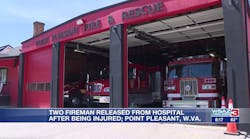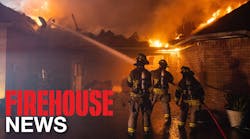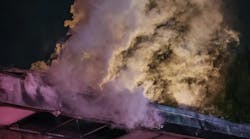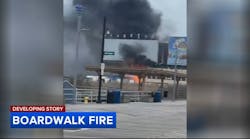To reinvent: To make over something from the beginning; To start again; To redesign in an effort to make better. Call it what you will, it's our new reality in emergency services.
If there is one thing about the recession that has caused my heart to ache it’s the reduction in firefighter staffing in many communities. Some economists have argued that economic downturns can force businesses and governments to examine their operations and find more efficient ways to operate. On the surface that sounds good. We want our governments to operate efficiently and we want to be good stewards of the public dollar.
However, the budgets of many fire departments have been chiseled away over the past ten years and all the while these departments were taking steps to reduce expenses and improve their efficiencies. Stated another way, they have become mean and lean, finding creative ways to provide the most essential services with minimal staffing. There was no more proverbial blood in the turnip. So, when cities looked for the next round of cuts there was nothing left to cut except personnel.
Now we’re being told by the economists and the federal government that the recession is over. So what is to come of fire departments in a post-recession (recovery) period? Will the jobs come back? My prediction is they will not (at least not in the short term). I am not a pessimist and I so much want to see the jobs of my brothers and sisters restored.
In my travels I have kept tuned in to what local leaders have been saying, both publicly and privately. This is what I hear them saying… Fire departments have been over staffed and over funded for years and the recession gave elected and appointed leaders the opportunity (a good excuse) to cut out the “excess” with a good reason to propose reductions (the economy). Some of these elected and appointed officials give me the appearance they are actually smug and gloating in their successful attempts to reduce the size of the fire department.
The elected and appoint officials are scripting your future, right now, without your involvement. I hope this does not come as a surprise to you. I’m seeing and hearing evidence of this almost daily. It may appear to you to be a diabolical scheme to even a past vendetta and, in some cases, it may be. Whatever the reason, I am confident the plans for how the future of fire protection is being provided in many towns is not being done with the involvement of the fire department but rather by politicos (elected and appointed) and that is a VERY dangerous thing because, for the most part, they do not have a clue (nor do they want one) about how dangerous it is to operate understaffed and under-resourced in high stress and high consequence environments.
Some fire department leaders have vocally opposed the reductions. Some leaders have resigned their positions or retired out of protest. Union leaders have stood their ground, but only with marginal success. Unfortunately, efforts to education about the consequences of reduced staffing is only seen as threatening or whining. Why? Because it’s not the answer the elected and appointed officials WANT to hear. What they want to hear is that you can do more with less and the cuts are not going to have an impact. Why not? Fire departments have always been able to do the job with whatever resources they are handed. It’s a backhanded compliment, for sure.
So when will the jobs come back? My prediction is the jobs will return very slowly, if at all. I also predict that it will take a crisis to reinstate firefighter (and for that matter police officer jobs). We all know this type of reaction is commonplace. There has to be an incident that results in serious injuries or fatalities. Then, and only then, do the elected and appointed officials begin to take grief from their constituents and the calls for action are heeded.
My concern is this: Firefighters are sworn protectors of humankind. Firefighters are wired for action. And unlike some elected and appointed leaders, firefighters will not play politics with the lives of residents. All of this spells the potential for the crisis previously mentioned to involve the lives of firefighters.
So what can you do? What should you do? First, continue to educate. If the elected and appointed politicos won’t listen, then continue to educate the public. Continue to carry the message of fire prevention, the importance of smoke and CO detectors and home fire safety. Explain what happens when staffing and budgets are cut. One way to do this that may avoid the perception of proffering threats is to use the example of major league sports.
For the most part, the general public does not understand the consequences of a residential structure fire being battled with a crew of ten versus a crew of 15. After all, ten may seem like a lot of people. If you were to explain the impact of reduced staffing in terms of a baseball game for example, where one team has a full complement of nine players while the opposing team only gets to play with six players, the impact of reduced staffing starts to take on a common understanding. Explaining that the deprived team may have to play the game without a first baseman or a catcher may help your citizens understand the impact.
The one thing I know for sure is that visionary fire departments should see the current and future economic environment and its consequences as more permanent than temporary. This means we should stop wallowing in our misery and denial and start to “reinvent” ourselves. What does it mean to “reinvent?” It’s a buzz word being used a lot these days. Reinvention begins with realizing forces have been invoked, bringing about permanent change how things will be done in the future.
The fire department of the future… the services provided… the quality of services… the quantity of services… will be different. Such a statement cuts to the core of the emotions of dedicated firefighters, especially when these changes mean doing less when resources are cut.
I am hopeful that firefighters and their command officers are having meaningful discussions about what “reinventing” means, especially as it relates to how strategies and tactics should be adjusted based on cuts in staffing. I fear that firefighters will continue to fight fires the same way they always have and that may prove to be a recipe for disaster.
To all my brothers and sisters I ask you take a hard look at the new economy and the need to “reinvent” the way you provide your services. If your line staffing has been reduced, discuss among your colleagues ways to work smarter and how to adjust your standard operating procedures accordingly. Remember that you mean the world to someone… act accordingly and take steps to ensure you safety.
Fire Chief (ret.) Richard B. Gasaway, PhD, EFO, CFO, MICP
www.RichGasaway.com






